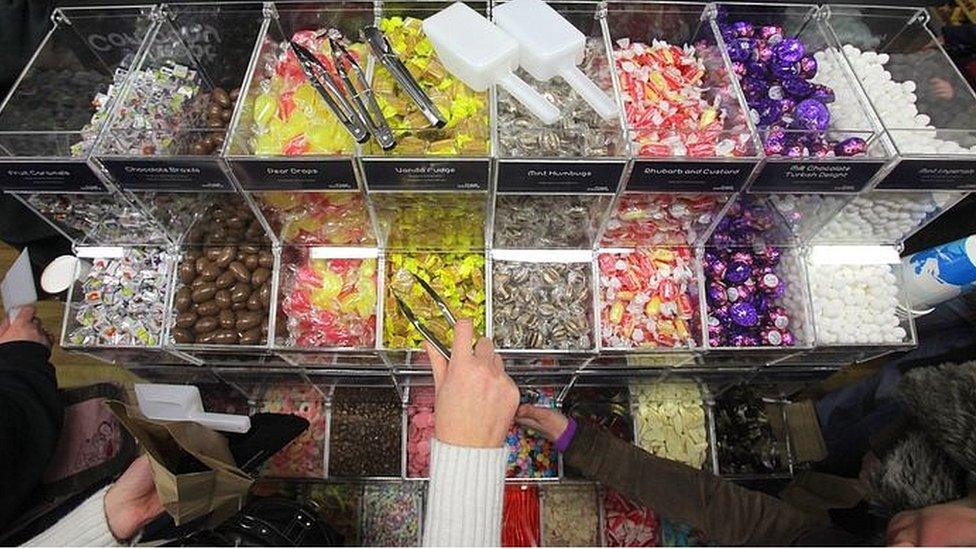What future for E numbers after Brexit?
- Published

Thinking about E numbers might stir up images of hyperactive children guzzling fluorescent soft drinks. But have you ever wondered what the E stands for?
Looking at this system of food additives can help illustrate some of the tough issues facing the British government as it prepares to leave the European Union.
The European Council introduced food colouring legislation in 1962 alongside a number classification system. In the 1990s the scheme was expanded to cover all additives permitted to be used in food sold in the EU and now forms a key part of UK food and drink regulation.
The government wants to begin formal Brexit negotiations by the end of March, after which UK laws will be made "not in Brussels but in Westminster", according to Prime Minister Theresa May.
So will the UK ditch E numbers and come up with a new system for assessing and labelling food additives? And what about the many other areas of UK regulation currently set by EU law?
Dial E for Europe
For a substance to be permitted for use as a food additive in the EU, it must be given an E number (the E stands for Europe). Codes like E101, E150d and E1209 are assigned to substances which change food colour, taste, shelf life or other properties.
For example E160b, or annatto, gives Red Leicester cheese its distinctive glow.
E numbers are often associated with processed food. Some, like E122, may have adverse effects on children prone to hyperactivity according to the NHS.
But most are perfectly benign and lots are good for us, like E300, otherwise known as Vitamin C.
At the moment if a food company comes up with a new additive, it must seek authorisation from an expert panel at the European Food Safety Authority. This EU body is made up of scientists from across the continent, including two from the UK.
They are experts in chemistry, toxicology and other relevant fields and meet regularly to assess which additives are safe. Once agreed, these substances must be clearly labelled on food sold in the UK or elsewhere in the EU.
What happens next?
As part of the Brexit process, the government has announced it will introduce a "Great Repeal Bill" in the next Queen's Speech.
This will remove the European Communities Act 1972 from the statute book and enshrine all existing EU law into British law, before the government decides which to keep and which to jettison.
This is likely to include EU regulations on food additives and labelling.
However such an approach opens up a number of other questions.
For example, what would happen when the EU changes its list of E numbers - will the UK adopt or ignore the new rules?
If it adopts them, how does this square with the government's wish that laws be made in Westminster and if it ignores E number changes, will domestic food companies be able to trade freely with European suppliers?
The government says it will push for the "freest possible trade" with the EU after Brexit.
But if the UK decided to keep E numbers while not being under the jurisdiction of European courts, there would need to be a new system whereby the EU's remaining 27 states could verify that UK goods observe the rules, says Stephen Weatherill, professor of European law at Oxford University.
"It is beyond complicated - and this is true of thousands and thousands of such matters," says Prof Weatherill.
But not everyone agrees.
"Some of the academics are making it more complicated than they need to," says Conservative MP Bill Cash, who chairs the House of Commons European Scrutiny Committee and is a long-standing supporter of Brexit.
He says the UK may choose to adopt standards like E numbers, but on the basis of voluntary compliance rather than by submitting to the EU's legal jurisdiction, enforced by the European Court of Justice.
Not much change?
There are many other unresolved questions when it comes to E numbers.
How will standards set by the UN's Food and Agriculture Organisation be incorporated, will the UK set up its own expert panel and will E numbers be renamed - "UK numbers" perhaps?
Nobody is quite sure of the answers yet.
These uncertainties hang over many areas of UK law which currently come from the EU, like farm subsidies, clean energy targets and fishing rules.
But if non-EU Switzerland is a model, we may simply retain many existing structures. Switzerland uses E numbers and belongs to lots of similar schemes like the European Health Insurance Card.
"There may not be as much change as people are trying to suggest there would be," says Mr Cash.
The Brexit negotiations will involve plenty of big constitutional issues, but there are many apparently smaller things, like E numbers, which will need to be sorted out as well.
- Published25 August 2010